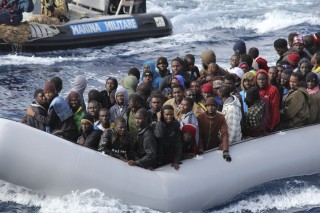To address the pertinent issue of migration overwhelming the European borders, leaders from the European and African Union countries met in Valletta, the capital city of Malta. While the stakes for EU are admittedly higher with series of boating mishaps on Mediterranean waters, the African Union with is yet to come up with a proactive way of addressing the global migrant crisis so far.
Following a meeting with the EU commission president Jean-Claude Juncker on migration and human trafficking in April, Nkosazana Dlamini-Zuma, the head of the African Union reportedly commented that “If people don’t have livelihoods at all, they are not going to sit and die of hunger, they are going to look for greener pastures,” and that quick solutions to these crisis do not exist. While there might not be an instant solution to this global problem in sight, this does not exclude the African Union from taking responsibility for its citizens.
According to the United Nations Refugee Agency (UNHCR), over 350,000 people have journeyed across the Mediterranean, out of which 3,075 have died or disappeared this year. Furthermore, some records indicate that six out of the ten largest countries of origin of refugees were African. Eritrea which heads this list is closely followed by Somalia, South Sudan, Gambia, Nigeria and Central African Republic. With the population of Africans that risk their lives to end up on the shores of Europe, no matter how dangerous, one would expect some form of commentary or concern from the AU. However, the Union so far has only made a promise to ‘work on it’ at an EU meeting in April.
While the EU has come up with steps of stemming this global problem which ranges from having a rescue operations on the sea to allegedly shutting its boarders, African leaders whose citizens constitute the bulk of migrants are yet to take any proactive measures, although they have met on several occasions to ‘discuss’ the crisis and ways of tackling it. The AU could have organized an emergency summit on its own continent, why did they have to wait for the EU’s Valletta summit? Does this suggest that African leaders feel entitled to EU’s help with its migrants?
According to Elizabeth Ohene, a Ghanaian journalist, the AU wastes no time in vocalizing its thoughts even on matters they are not well informed about, however, their silence on this salient issue may hinder the world from taking their commentary seriously. “I have heard African governments make statements on issues that do not concern them in any way; I have heard them on issues when their opinions are not sought and I have heard brave statements on issues about which we obviously are not well informed. But the drama unfolding on the North African coast demands some noise of some kind from Africa. Otherwise we shall forfeit forever the right to comment on any other world event”.
Agreed that the EU has to come up with tangible solutions to the migrant crisis, it is however imperative that African leaders have to take responsibility for curbing migration at the source. While African governments cannot stop their citizens from leaving their countries, the AU has a responsibility to limit the tragic deaths that come with seeking better economic prospects.
Also, African leaders have a responsibility to secure their borders and take measures in tightening them against trafficking, in the aim of making their countries a safe haven with stable economic conditions.








